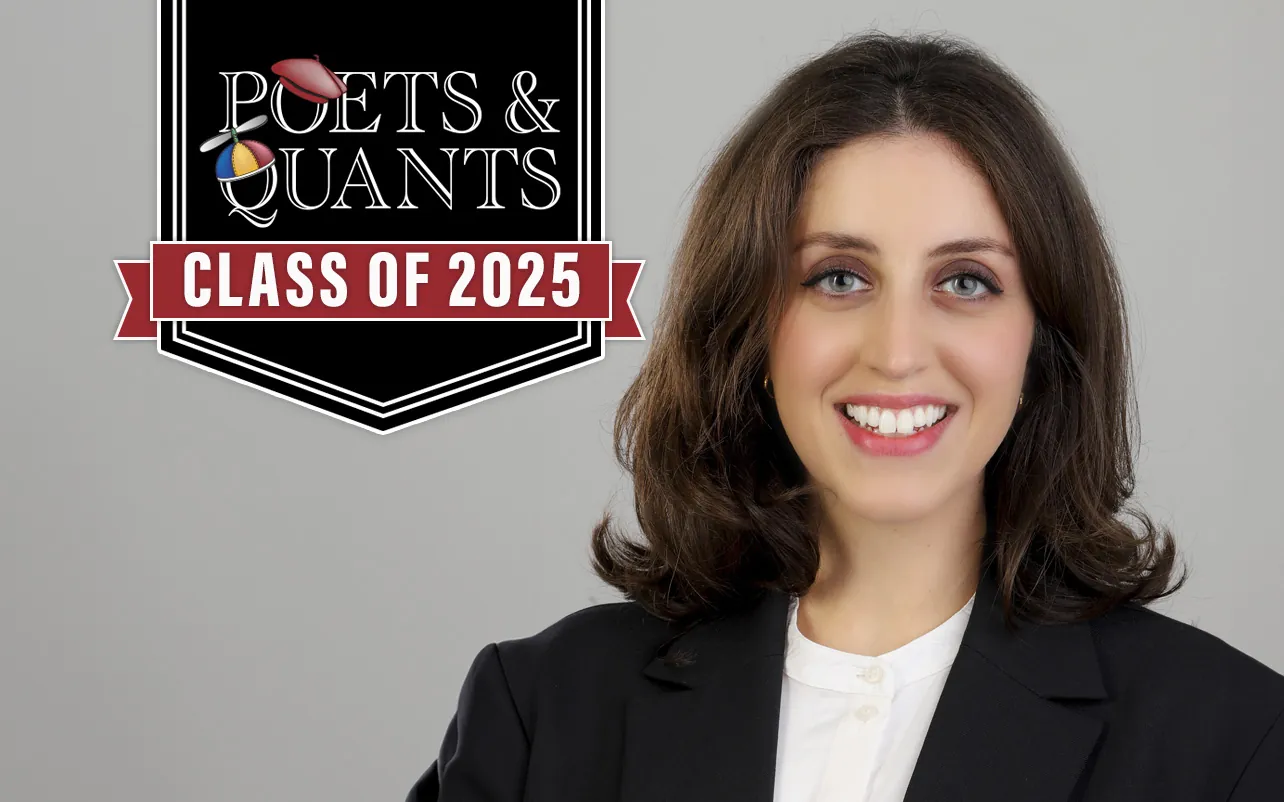Zeynep Alraqeb
Columbia Business School
“My heart dances to football’s thrill; in finance-tech union, my curiosity unfolds its will.”
Hometown: Cologne, Germany and Istanbul, Turkey
Fun Fact About Yourself: My life is documented in several journals – in Moleskine ones only!
Undergraduate School and Major: University of Cologne (BSc) and University of Warwick (MSc), major in Economics
Most Recent Employer and Job Title: German Federal Bank, Data Associate
What makes New York City such a great place to earn an MBA? It’s New York City or nowhere: the way this iconic city embraces diversity is nothing short of remarkable.
Take me, for example. As a German-Syrian who grew up in Turkey, New York City provides a dynamic space for me to unfold my full personality and potential. Here, I have the freedom to embrace my German heritage during a business breakfast with U.S.-German policymakers, revel in my Turkish roots on significant cultural occasions, or channel my Syrian background when hosting a dinner night. Each of these moments serves as a gateway to intriguing conversations, offering endless new perspectives, and cultivating rich cultural insights.
This embrace of diverse backgrounds creates not only a vibrant community but also a landscape filled with innovation and creativity. Your potential here is not confined by traditional boundaries, and your unique heritage can become a catalyst for fresh ideas and meaningful connections. Whether in the realms of business, art, or social endeavors, New York’s willingness to recognize and integrate various cultures is what truly sets it apart. It’s a city that doesn’t just tolerate differences but actively seeks to weave them into its identity, inspiring growth, fostering collaboration, and nurturing a shared sense of humanity.
Aside from your classmates and location, what was the key part of Columbia Business School’s MBA curriculum programming that led you to choose this business school and why was it so important to you? One example: The Columbia Business School/KKR Diversity, Inclusion, and Innovation Case Competition within the Private Equity Program! This competition demonstrated to me that Columbia’s MBA program excels not only in strengthening finance skills in the classroom but also in preparing future finance leaders to embrace diversity, recognizing its inherent beauty and benefits. Having had exposure to various financial institutions, I understand that there is still substantial work to be done regarding DEIA (Diversity, Equity, Inclusion, and Accessibility) in leadership positions, especially in the fields of private equity (PE) and venture capital (VC). That’s exactly what Columbia’s MBA aims to change, and it provides us with the right tools to become empathetic leaders who can make a real difference in the professional world.
What has been your first impression of the Columbia Business School MBA students and alumni you’ve met so far. Tell us your best CBS story so far. Awesome! I instantly felt a warm welcome and a collaborative, inspiring feeling. The best part: It already started during my MBA application process! For instance, one current MBA candidate shared her knowledge and experience with me, helping me craft a strong application and excel in the interview by being at my best. That exchange was precious and highlighted why CBS was my dream choice.
What course, club or activity excites you the most at Columbia Business School? I can’t wait to engage with fascinating women at Columbia Business School. For instance, I look forward to immersing myself in the work of leading professors like Angela Lee. Her course, Building a VC Investment Thesis, will guide me in formulating my own criteria for investing in startups.
Beyond academics, I’m eager to initiate and organize events within the Columbia Women in Business (CWIB) club. The opportunity to connect with passionate and driven individuals and collaborate to create and effect meaningful change is what truly excites me. Along with these experiences, I hope to have the chance to meet Minouche Shafik, the newly-appointed and first female president of Columbia University. Her leadership and vision are sure to inspire many, myself included.
Describe your biggest accomplishment in your career so far: As a former economist within a central bank, I know that stability is key. However, in the face of various global challenges and developments such as climate change and technological advancements, it’s essential to adopt changes even within conservative and traditional institutions.
Looking back, I’m proud of the changes I’ve been able to implement within several divisions, whether it was automating data processes or introducing Design Thinking methodology to solve data management and product problems. These initiatives certainly met with some resistance, but at the same time, they taught me never to take ‘no’ for an answer.
What do you hope to do after graduation? I love the fusion of finance and technology, and I’m eager to explore how AI impacts the financial sector. That’s precisely the field where I’d like to immerse myself after completing my MBA. One day, I hope to start my own company, perhaps even with some of my classmates.
What other MBA programs did you apply to? n/a
What advice would you give to help potential applicants gain admission into Columbia Business School’s MBA program? First, prepare your hard facts (such as a strong GPA and GMAT/GRE scores) and ask yourself why you need an MBA as the next step in your career. Second, research thoroughly everything you can about Columbia Business School. If possible, attend mock lectures and speak to current and former MBA students to gain insights into the program. Lastly, reflect on how Columbia Business School is the unique business school that can bring you closer to your major life goals. Consider what sets it apart from other business schools and how it aligns specifically with your aspirations. Remember to always tell your unique story.
DON’T MISS: MEET COLUMBIA BUSINESS SCHOOL’S MBA CLASS OF 2025










